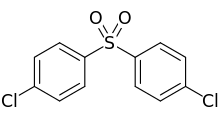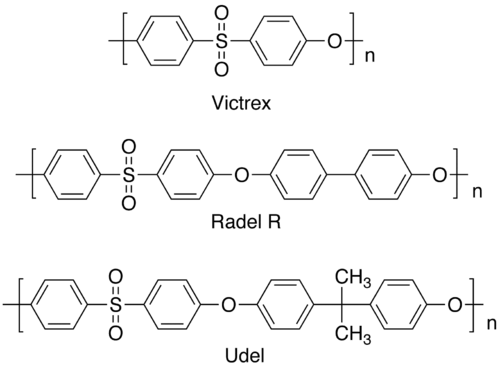4,4'-Dichlorodiphenyl sulfone
 | |
| Names | |
|---|---|
| Systematic IUPAC name
1,1′-Sulfonylbis(4-chlorobenzene) | |
Other names
| |
| Identifiers | |
3D model (JSmol) |
|
| ChemSpider | |
| ECHA InfoCard | 100.001.135 |
PubChem CID |
|
| |
| |
| Properties | |
| C12H8Cl2O2S | |
| Molar mass | 287.15 g·mol−1 |
| Appearance | White solid |
| Melting point | 148 °C (298 °F; 421 K) |
| Boiling point | 397 °C (747 °F; 670 K) |
| Insoluble | |
| Hazards | |
| Safety data sheet | External MSDS |
Except where otherwise noted, data are given for materials in their standard state (at 25 °C [77 °F], 100 kPa). | |
| Infobox references | |
4,4′-Dichlorodiphenyl sulfone (DCDPS) is an organic compound with the formula (ClC6H4)2SO2. Classified as a sulfone,[1] this white solid is most commonly used as a precursor to polymers that are rigid and temperature-resistant such as PES or Udel.[2]
Synthesis
DCDPS is synthesized via sulfonation of chlorobenzene with sulfuric acid, often in the presence of various additives to optimize the formation of the 4,4′-isomer:
- ClC6H5 + SO3 → (ClC6H4)2SO2 + H2O
It can also be produced by chlorination of diphenylsulfone.[3]
Uses
DCDPS is the starting material in the polymerization of compounds such as Udel, PES and Radel R. The polymerization occurs through a nucleophilic substitution reaction of DCDPS with difunctional nucleophiles. With bisphenol A in dimethyl sulfoxide, DCDPS forms a material called Udel. This and related condensations adhere to the following stoichiometry:[2]
- n (ClC6H4)2SO2 + n HO−X−OH → [(O−X−OC6H4)2SO2]n + 2n HCl
Udel is a high-performance amorphous sulfone polymer that can molded into a variety of different shapes. It is both rigid and temperature-resistant, and has applications in everything from plumbing pipes, to printer cartridges, to automobile fuses. DCDPS also reacts with bisphenol S to form PES. Like Udel, PES is a rigid and thermally-resistant material with numerous applications.
The general polymerization reaction:
Some of the products include:

References
- ↑ Sime, J. G; Abrahams, S. C. (1960). "The crystal and molecular structure of 4,4′-dichlorodiphenyl sulphone". Acta Crystallographica. 13 (1): 1–9. doi:10.1107/S0365110X60000017.
- 1 2 Parker, David; Bussink, Jan; Grampel, Hendrik T.; Wheatley, Gary W.; Dorf, Ernst‐Ulrich; Ostlinning, Edgar; Reinking, Klaus; Schubert, Frank; Jünger, "Polymers, High‐Temperature", Ullmann's Encyclopedia of Industrial Chemistry, Weinheim: Wiley-VCH, doi:10.1002/14356007.a21_449.pub3
- ↑ Kovacic, Peter; Brace, Neal O. (1954). "Chlorination of Aromatic Compounds with Metal Chlorides". Journal of the American Chemical Society. 76 (21): 5491–5494. doi:10.1021/ja01650a069.
- Graybill, Bruce M. (1967). "Synthesis of aryl sulfones". The Journal of Organic Chemistry. 32 (9): 2931–2933. doi:10.1021/jo01284a075.
- Udel Polysulfone Design Guide (Report). Alpharetta, GA: Solvay Advanced Polymers. p. 7–10.